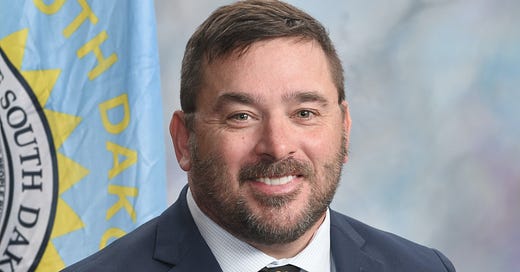Meet the Candidate: Sen. Mike Walsh seeks re-election to District 35 Senate seat
Michael Walsh appointed to the Legislature in 2024
First-term Sen. Mike Walsh seeks re-election to the South Dakota State Senate in District 35. Walsh was appointed by Gov. Kristi Noem in 2024, after a vacancy was created by the departure of former Sen. Jessica Castleberry.
District 35 includes portions of eastern Rapid City, to include the Rapid Valley area and Box Elder.
The Dakota Scout sent a series of questions to all legislative candidates running in contested races for the state House and Senate in the June 4 primary election. Candidates were asked to limit their responses to each question to 150 words or less.
Age: 52
City of residence: Box Elder
Profession: US Marine Veteran, Retired Law Enforcement, Small Business Owner
Public service/community service experience: Appointed as District 35 State Senator; former Chairman of the Multicultural Center Board of Directors, former President of the South Dakota Fraternal Order of Police
Family information: Married to Autumn, father to Jane
1) What's the government's role in facilitating economic development in South Dakota?
Economic development and success benefits everybody. Whether it's employees, employers, families, and local government. Government should have the appropriate amount of involvement, no more and no less.
The regulatory conditions and tax policies should be business friendly, and should incentivize investment in businesses, both small and established. When the businesses do well, it creates a need for workforce. A skilled workforce is essential for economic development, and that includes some of the more highly skilled technical trades. South Dakota government’s involvement would be best served in workforce development and higher and technical education.
One of the roles of government is infrastructure. A strategic investment in infrastructure will be a key driver in facilitating economic growth. That in and of itself will pay dividends in building the economy, which benefits the state as well.
There are areas in which government can partner with private entities through partnerships. Private entities often have the expertise and investment that will benefit some of the public projects.
Any role that the government plays should be handled at the level most appropriate, and that is very often local government. Local control will often be in a better position to assist or regulate issues involving the economy. Whether it is through tax incentives, grants, or other financial assistance, local government can be directly involved in the economic growth in their communities, and where necessary, the state of South Dakota can be a facilitator. Appropriate legislative actions can provide support in areas that local government can’t.
2) If you could have dinner with any person, dead or alive, who would it be and why?
For me, that is hard to narrow down to just one person. It depends on the topic. My answers for government, military history and tactics, religion, fine arts, philosophy, et cetera, all have separate answers.
If forced to simply pick one person, it would likely be retired Marine Corps General Jim Mattis. He is exceedingly well read, thoughtful, blunt, and experienced. He has a lot to offer on many of the topics I previously listed. I would certainly want it to be a much longer conversation than just over dinner. While I suspect Gen. Mattis would be able to converse about any of those topics without stopping for a breath, I know that he is also a listener, and it would be a fascinating conversation.
3) Does the "Landowner Bill of Rights" -- adopted by the Legislature amid opposition to carbon pipeline companies using eminent domain -- strike the right balance between the interests of property owners, counties and the ag industry - and should voters get a say when they head to the polls in November?
I will answer the last question first. Ultimately, the voters should always have a say in what they believe. Having your voice heard is a bedrock of our Republic.
This bill does not address eminent domain at all. Eminent domain refers to the power of the government to take private property and convert it to public use. That is absolutely not the case with this bill, and it is very specific to one type of pipeline.
This bill and the Landowner Bill of Rights within it address appropriate procedures and compensation for the pipeline company to work with both the landowners and the local government. A number of issues were addressed by adding the landowner Bill of Rights.
As I read the bill, there is no section regarding any seizure of private land for public use, nor any seizure of land for private use. In fact, the easements and buried pipeline infrastructure that this bill addresses are no different than having water, sewer, natural gas, electricity, or any other utility which goes on to a person's land. The only difference is the landowners who will be impacted by any pipeline will be guaranteed adequate financial compensation. Additionally, those farmers and ranchers will still be able to use the land for its intended purpose.


















